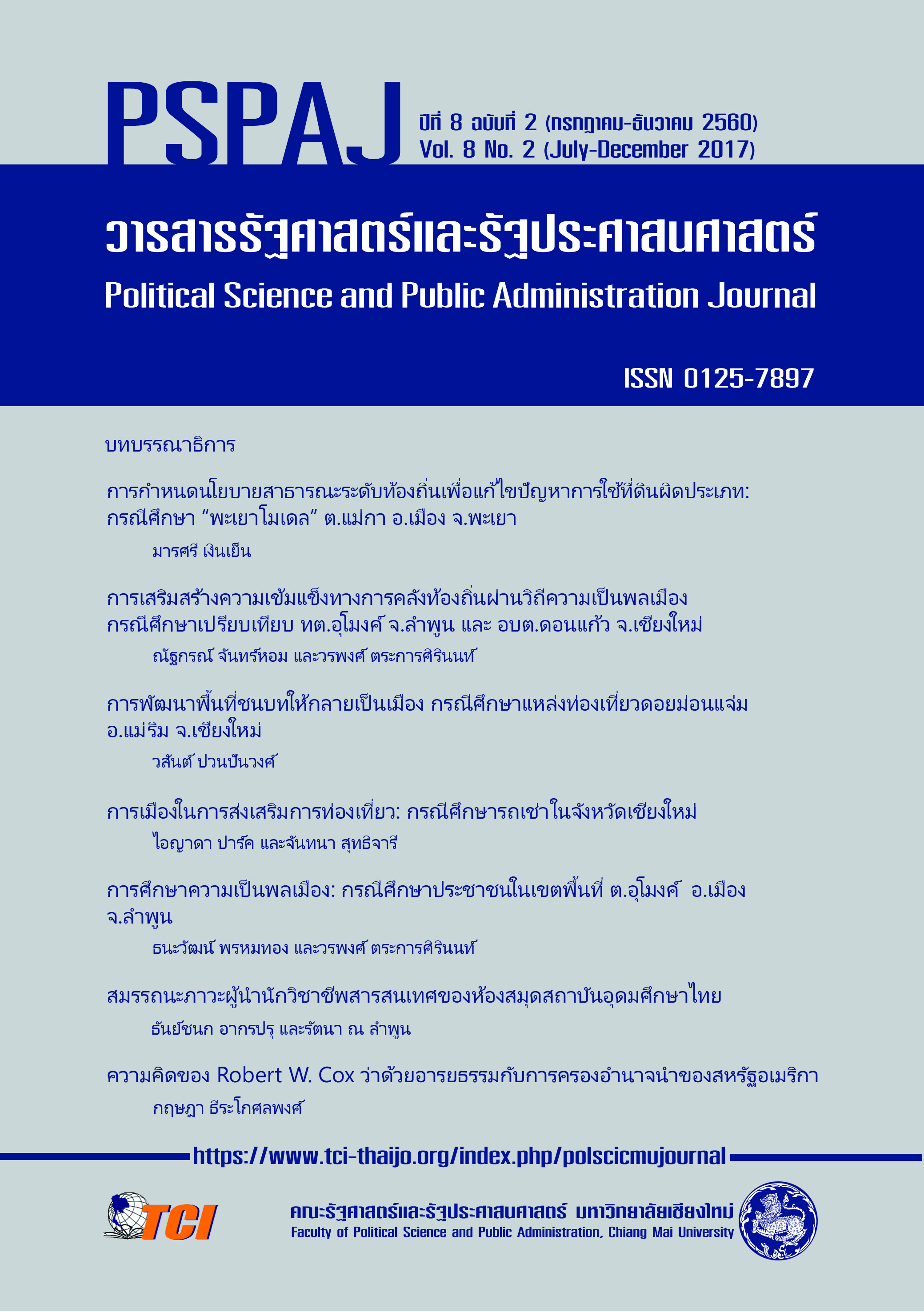ความคิดของ Robert W. Cox ว่าด้วยอารยธรรม กับการครองอำนาจนำของสหรัฐอเมริกา
Main Article Content
บทคัดย่อ
บทความนี้ศึกษาความคิดของ Robert W. Cox ในประเด็นของอารยธรรม ในทศวรรษ 1940 ซึ่งได้นำเสนอเกี่ยวกับความขัดแย้งทางการเมืองใน Quebec โดยมีรากฐานจากอารยธรรมในแคนาดา ครอบคลุมเชื้อชาติ ภาษา และศาสนา เขาได้เสนอแนวคิดว่าด้วยอารยธรรมขึ้นมาภายหลังสงครามเย็น เพราะไม่เห็นด้วยกับการมุ่งความสำคัญที่ความขัดแย้งทางการเมืองของ Samuel Huntington และ Francis Fukuyama แต่กลับเพิกเฉยต่อโครงสร้างทางเศรษฐกิจและความสัมพันธ์ทางสังคม อันที่จริงแล้วความขัดแย้งทางอารยธรรมก่อตัวมาตั้งแต่ระบบรัฐเวสฟาเลียนและสร้างขึ้นมาโดยประเทศในภาคพื้นยุโรป ดังนั้นการครองอำนาจนำของสหรัฐอเมริกาในศตวรรษ 21 ที่มีเป้าหมายเพื่อครอบงำทางอารยธรรมเพียงหนึ่งเดียว จึงยังประสบปัญหาจากการต่อสู้ของอารยธรรมจีนในระบบทุนนิยมโลกและอารยธรรมอิสลามก็ตอบโต้ต่ออารยธรรมตะวันตกด้วยการก่อการร้าย หรือเรียกได้ว่าการตอบโต้การครองอำนาจนำ
Downloads
Article Details
- เนื้อหาและข้อมูลที่ลงตีพิมพ์ในวารสารรัฐศาสตร์และรัฐประศาสนศาสตร์ถือเป็นข้อคิดเห็นและความรับผิดชอบของผู้เขียนบทความโดยตรง ซึ่งกองบรรณาธิการวารสารรัฐศาสตร์และรัฐประศาสนศาสตร์ ไม่จำเป็นต้องเห็นด้วย หรือร่วมรับผิดชอบใดๆ
- บทความและข้อมูล ที่ได้รับการตีพิมพ์ในวารสารรัฐศาสตร์และรัฐประศาสนศาสตร์ ถือเป็นลิขสิทธิ์ของวารสาร หากบุคคลหรือหน่วยงานใดต้องการนำข้อมูลไปใช้ประโยชน์ในทางวิชาการ ขอให้อ้างอิงแหล่งที่มาด้วย
เอกสารอ้างอิง
Cox, R. W. (1948). The Quebec provincial general election of 1886. (Master’s thesis), McGill University, Canada.
______. (1964). International organisations: Their historical and political context. Geneva: International Institute for Labour Studies. Retrieved from https://www.ilo.org/public/libdoc/ilo/1964/64B09_95_engl.pdf.
______. (1969a). The executive head: an essay on leadership in international organization. International Organization, 23 (2), 205-230.
______. (1969b). International organization: world politics. London: Palgrave Macmillan.
______. (1973). ILO: limited monarchy. In R. W. Cox and H. K. Jacobson (Eds.). The anatomy of influence. (pp.102-138). London: Yale University.
______. (1976). On thinking about future world order. World Politics, 28 (2), 175-196.
______. (1977). Labor and hegemony. International Organization, 31 (3), 385-424.
______. (1981). Social forces, states and world orders: beyond international relations theory. Millennium-Journal of International Studies, 10 (2), 126-155.
______. (1983). Gramsci, hegemony and international relations: an essay in method. Millennium-Journal of International Studies, 12 (2), 162-175.
______. (1987). Production, power, and world order: social forces in the making of history. New York: Columbia University Press.
______. (1995a). Critical Political Economy. In B. Hettne. (Ed.). International Political Economy: Understanding Global Disorder. (pp.31-45). London: Zed Books.
______. (1995b). Civilizations: encounters and transformations. Studies in Political Economy, 47 (1), 7-31.
______. (1996a). Influences and Commitments. In R. W. Cox and T. J. Sinclair (Ed.). Approaches to world order. (pp.19-38). Cambridge: Cambridge University Press.
______. (1996b). Civilisations in world political economy. New Political Economy, 1 (2), 141-156.
______. (1997). An alternative approach to multilateralism for the twenty-first century. Global Governance, 3 (1), 103-116.
______. (1999). Civil society at the turn of the millenium: prospects for an alternative world order. Review of international studies, 25 (1), 3-28.
______. (2000). Thinking about civilizations. Review of International Studies, 26 (5), 217-234.
______. (2001). Civilizations and the twenty-first century: some theoretical considerations. International Relations of the Asia-Pacific, 1, 105-130.
______. (2004). Beyond empire and terror: critical reflections on the political economy of world order. New Political Economy, 9 (3), 307-323.
______. (2005). A Canadian dilemma: The United States or the world. International Journal, 60 (3), 667-684.
______. (2007). The international in evolution. Millennium-Journal of International Studies, 35 (3), 513-519.
______. (2008). The point is not just to explain the world but to change it. In C. Reus-Smit and D. Snidal (Ed.). The Oxford Handbook of International Relations. (pp.84-93). New York: Oxford University Press.
______. (2009). The ‘British School’ in the global context. New Political Economy, 14 (3), 315-328.
______. (2012). Consciousness and civilization: The inside story. Retrieved from https://stephengill.com/news/wp-content/uploads/RW-Cox-York-lecture-Oct-2012.pdf.
______. (2013). Universal foreigner: The individual and the world. World Scientific.
______. (2014). Critical Theory. In T. G. Weiss & R. Wilkinson. (Eds). International organization and global governance. (pp157-168). Oxon: Routledge.
Cox, R. W. and Jamieson, S. M. (1974). Canadian labor in the continental perspective. International Organization, 28 (4), 803-826.
Cox, R. W. and Schechter, M. G. (2002). The political economy of a plural world: Critical reflections on power, morals and civilization. New York: Routledge.
Dale, R. and Robertson, S. (2003). Interview with Robert W. Cox. Globalisation, Societies and Education, 1 (1), 13-23.
Drache, D. and Valdes-Ugalde, J. L. (2009). The international system: Hinge moments and structural long-term trends. A Canadian perspective: interview with Robert W. Cox. Norteamerica, 4 (2), 157-172.
Fukuyama, F. (1989). The end of history?. The National Interest, 16, 3-18.
Gill, S. (1986). Hegemony, consensus and trilateralism. Review of International Studies, 12 (3), 205-222.
______. (1991). American hegemony and the trilateral commission. New York: Cambridge University Press.
Hoogvelt, A., Kenny, M., and Germain, R. (1999). Conversations with Manuel Castells, Robert Cox and Immanuel Wallerstein. New Political Economy, 4 (3), 379-408.
Huntington, S. (1993). The clash of civilizations?. Foreign Affairs, 72 (3), 22-49.
Keohane, R. O. (1986). Neorealism and its Critics. New York: Columbia University Press.
Morse, D. (1969). The origin and evolution of the I.L.O. and its role in the world community. New York: Cornell University.
N. M. (1971). International Labor in Crisis. Foreign Affairs, 49 (3), 519-532.
Schouten, P. (2009) Theory Talk #37: Robert Cox on world orders, historical change, and the purpose of theory in international relations, Retrieved from https://dl.dropboxusercontent.com/u/30572320/Theory%20Talks/
Talkspdf/Theory%20Talk37_Cox.pdf.


